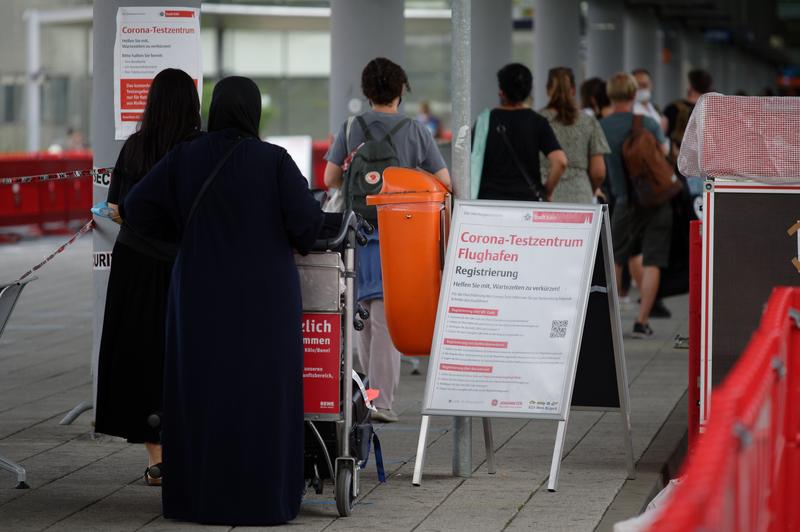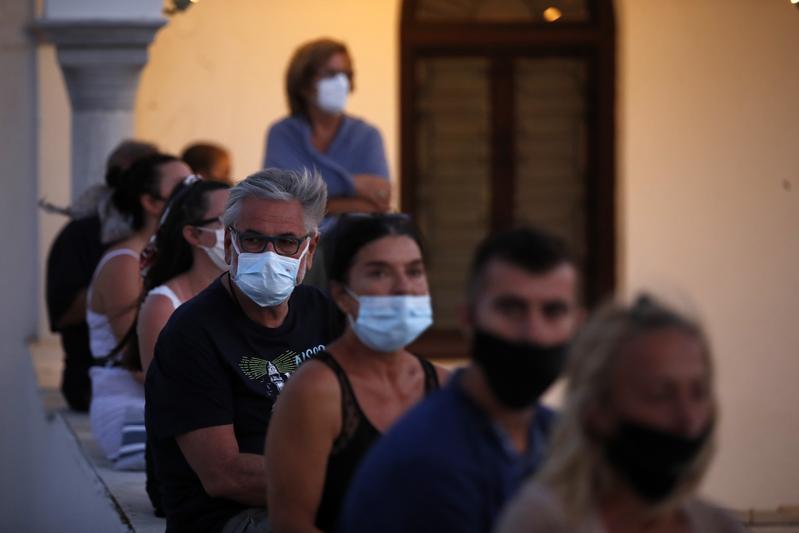 Travellers returning from risk areas wait for a coronavirus test at Cologne/Bonn Airport, in Cologne, Germany, Aug 14, 2020. (HENNING KAISER / DPA VIA AP)
Travellers returning from risk areas wait for a coronavirus test at Cologne/Bonn Airport, in Cologne, Germany, Aug 14, 2020. (HENNING KAISER / DPA VIA AP)
MADRID / RABAT / RABAT / ATHENS / SANTIAGO / QUITO / BERLIN / PARIS / BUENOS AIRES / OTTAWA / BOGOTA / KIGALI - Germany reported 1,510 new coronavirus cases on Saturday, the highest single-day increase since April 30, according to data from Johns Hopkins. Total cases rose to 223,791. Thirteen new deaths were reported, a number roughly in line with figures seen through August and July.
The four-day reproduction factor -- or R value -- calculated by Germany’s health body, was 1.08 for the day before. The seven-day R value, which is seen as being less influenced by fluctuations, was 1.14 on Friday.
Germany declared nearly all of Spain, including the tourist island of Mallorca, a coronavirus risk region following a spike in cases there.
The move deals a blow to hopes for a swift revival of mass tourism after months of lockdown all but wiped out this year’s high season in Europe.
The latest version of the RKI’s list on its website said the whole of mainland Spain and the Balearic islands were risk regions.
Designations as risk regions are typically followed by the German Foreign Ministry warning against tourist travel to those areas and mean people returning from there face a coronavirus test or two weeks’ compulsory quarantine.
ALSO READ: Germany new cases rise most in 6 weeks as global tally tops 17m
Global
Global COVID-19 cases surpassed 21 million on Friday, according to the Center for Systems Science and Engineering (CSSE) at Johns Hopkins University.
The global case count reached 21,020,216, with a total of 761,393 deaths worldwide as of 3:27 pm local time (1927 GMT), the CSSE data showed.
The United States reported the most COVID-19 cases and deaths, standing at 5,280,315 and 167,948, respectively. Brazil recorded 3,224,876 cases and 105,463 deaths, followed by India with more than 2.4 million cases.
Argentina
Argentina extended until Aug 30 restrictions taken against the coronavirus, President Alberto Fernandez said on Friday, affirming that the country’s lockdown would continue in its current form in an around capital city Buenos Aires.
The measures, which are more relaxed in less densely populated areas, had been scheduled to expire on Sunday.
Argentina has had 276,072 confirmed cases of COVID-19, 5,428 of which have been fatal.
The country’s lockdown began on March 20.
Argentina and Mexico will produce the AstraZeneca COVID-19 vaccine for most of Latin America. Its rollout is expected in the first quarter, Fernandez said.
Canada
Canada is planning for a “reasonable worst case scenario” in which new waves of the coronavirus would intermittently swamp the public health system and send the death toll soaring, officials said on Friday.
Under the scenario, there would be a large peak later this year followed by a number of smaller peaks and valleys stretching to January 2022. Each peak would exceed the health system’s capacity.
The system has so far managed to deal with the outbreak but evidence shows that if it does suffer breakdowns, “the mortality goes up really really high”, chief public health officer Theresa Tam told a briefing.
Tam declined to say what the chances were of the worst case scenario occurring.
Potentially complicating factors include an outbreak of influenza at the same time as a resurgence of coronavirus, officials said. The cumulative death toll in Canada could be as high as 9,115 by Aug 23, up from the 9,015 at present, the forecast predicted.
Colombia
The Colombian Ministry of Health and Social Protection reported on Friday that the total number of confirmed cases of COVID-19 in the country rose to 445,111, with 14,492 deaths.
The ministry reported that 11,306 new cases and 347 more deaths were reported, and that 41,434 tests for the disease were carried out in the last 24 hours.
Chile
Chile reported on Friday that the total number of confirmed cases of COVID-19 in the South American country has risen to 382,111, with 10,340 deaths.
According to the Health Ministry, in the previous 24 hours, tests detected 2,077 new cases and 41 more patients died of the virus.
Chilean health authorities said 355,037 people have recovered from the disease and 16,734 cases are considered active.
Ecudor
Ecuador's Ministry of Public Health reported on Friday that the country's total number of confirmed COVID-19 cases has reached 99,409, with 6,030 deaths.
According to the health authorities, in the last 24 hours, the South American nation registered 1,066 new infections and 20 more deaths of COVID-19.
The country is still struggling to control the spread of the virus and is registering a growing number of infections, especially in the capital city of Quito in Pichincha province, the current epicenter of COVID-19 in Ecuador.
Ethiopia
Ethiopia's confirmed COVID-19 cases reached 27, 242 after 1,038 new COVID-19 positive cases were confirmed on Friday, the country's Ministry of Health said.
The ministry, in a statement issued on Friday, revealed that from a total of 17,323 medical tests that were conducted within the last 24 hours, some 1,038 of them tested positive for COVID-19, eventually bringing the total number of positive cases to 27,242.
Thirteen more patients succumbed to illnesses related to the COVID-19 pandemic on Thursday, bringing the total number of COVID-19 related deaths in the East African country to 492, according to the ministry.
Egypt
Egypt registered on Friday 112 new COVID-19 cases, taking the total infections in the country to 96,220, Egyptian Health Ministry said.
It is the 13th day in a row for Egypt's COVID-19 daily infections to fall below 200, after they started to exceed 200 on April 23.
Also on Friday, 17 patients died from the respiratory disease, bringing the death toll to 5,124, Health Ministry spokesman Khaled Megahed said.
France
France declared its capital Paris and the port city of Marseille high-risk zones for the coronavirus on Friday as the government reported more than 2,500 new infections for the third day in a row.
The seven-day moving average of new infections, which smoothes out reporting irregularities, increased to 2,041, doubling over the last two weeks.
This went beyond the 2,000 threshold for the first time since April 20, when France was in the middle of one of Europe’s strictest lockdowns.
In the wake of these figures, Paris authorities published an updated map where wearing a mask will be mandatory, with whole swaths of the city now covered by the measure, including the famed Champs Elysees, which had been left out of the initial map.
Despite the rise in cases, which prompted Britain to remove France from its list of safe travel destinations, the number of people hospitalised due to the disease continued to fall, having dipped below 5,000 for the first time since mid-March on Wednesday.
The total official tally of cases now stands at 212,211.
The daily death toll increased by 18 to 30,406 on Friday versus a rise of 17 over the last two days.
 People wearing face masks against the spread of the new coronavirus, as they sit at the yard during a church service, on the Aegean island of Tinos, Greece, on Aug 14, 2020. (THANASSIS STAVRAKIS / AP)
People wearing face masks against the spread of the new coronavirus, as they sit at the yard during a church service, on the Aegean island of Tinos, Greece, on Aug 14, 2020. (THANASSIS STAVRAKIS / AP)
Greece
Greece set a temporary 50-person limit on public gatherings on Friday and said restaurants and bars in Athens and other areas must close by midnight, as the country seeks to contain a recent spike in COVID-19 infections.
The deputy civil protection minister said the limit on public gatherings would last until Aug. 24 and be imposed in parts of the country where infection numbers have risen.
Recent data has shown COVID-19 infections have started to spread among lower age groups, Mitsotakis said, and he urged those returning from vacation to large urban centres to wear masks.
Greece reported 262 new infections on Wednesday, its highest daily tally since the start of the outbreak in the country. Another 254 cases were reported on Friday.
That brings the total number of infections in Greece to 6,632 since late February, with 223 deaths.
The jump in infections has led the authorities gradually to introduce more restrictions at the peak of the tourism season.
Mask wearing will also be mandatory at refugee camps and military facilities.
Greece has also said visitors arriving from Sweden, Belgium, Spain, the Netherlands and the Czech Republic must show proof that they have tested negative for the coronavirus before they can enter the country.
Mexico
Restrictions on non-essential land traffic along the border between Mexico and the United States will be extended until Sept. 21 due to the novel coronavirus pandemic, the Mexican Foreign Ministry announced on Friday.
According to the ministry, Mexico proposed the extension of the partial closure of the border for another month after reviewing the development of the pandemic in both countries.
The measure, implemented on March 21 along the common border, restricts travel for tourism or recreational purposes but permits commercial, medical and essential work-related travel.
Morocco
Morocco on Friday reported 1,306 new COVID-19 cases, raising the total number of infections in the country to 39,241.
The number of recoveries from the coronavirus in Morocco increased to 27,644 after 957 more were added, while the death toll rose by 27 to 611, said Mouad Mrabet, coordinator of the Moroccan Center for Public Health Operations at the Ministry of Health.
Meanwhile, 163 patients are in intensive care units.
Rwanda
Rwanda on Friday reported a daily surge of 93 new COVID-19 cases and 46 recoveries, after a two-week downward trend in active cases.
The rise has brought the nationwide total infections and recoveries to 2,293 and 1,604, respectively.
 A man smokes on a terrace bar in Barcelona, Spain, Aug 14, 2020. Spanish Health Minister Salvador Illa has announced a range of new nationwide restrictions to help fight a surge in COVID-19 cases. (EMILIO MORENATTI / AP)
A man smokes on a terrace bar in Barcelona, Spain, Aug 14, 2020. Spanish Health Minister Salvador Illa has announced a range of new nationwide restrictions to help fight a surge in COVID-19 cases. (EMILIO MORENATTI / AP)
Spain
Spain on Friday ordered nightlife establishments to close and banned drinking on the street in an effort to stem a coronavirus resurgence - measures that caused anger and dismay in the hard-hit hospitality sector.
Smoking in public places where keeping a safe distance from people is impossible was also banned, Health Minister Salvador Illa told a news conference.
Bars and restaurants will have to down their shutters by 1 am as part of the new restrictions, Illa said.
The minister also advised against gatherings of more than 10 people and specifically warned young people not to gather outside to drink alcohol, a popular practice called “botellones”.
Infections in Spain have risen in recent days following the end of Spain’s tough lockdown seven weeks ago.
Friday’s almost 3,000 new cases, although little changed from Thursday, were about double the average in the first 12 days of August and brought the cumulative total to 342,813 - the highest number in Western Europe.
The increase in infections has led to worries the country could return to the grim situation it experienced in early April when the daily COVID-19 death toll approached 1,000, but Illa played down such concerns.
Official data shows 62 people have died over the past week, bringing Spain’s total coronavirus death toll to 28,617.
To curb the epidemic, authorities imposed a strict lockdown in the whole of Spain in mid-March that lasted until late June and all but wrecked the country’s tourism-dependent economy.
ALSO READ: Spain: Coronavirus traces found in March 2019 sewage sample
Tunisia
The spread of COVID-19 continues in Tunisia, with 49 new domestic infections and seven imported cases during the last 24 hours, said Tunisian Ministry of Health on Friday.
It said in a statement that the total number of confirmed cases in the country reached 1,903.
A total of 1,320 patients have recovered in Tunisia while 53 deaths were reported, according to the statement.


